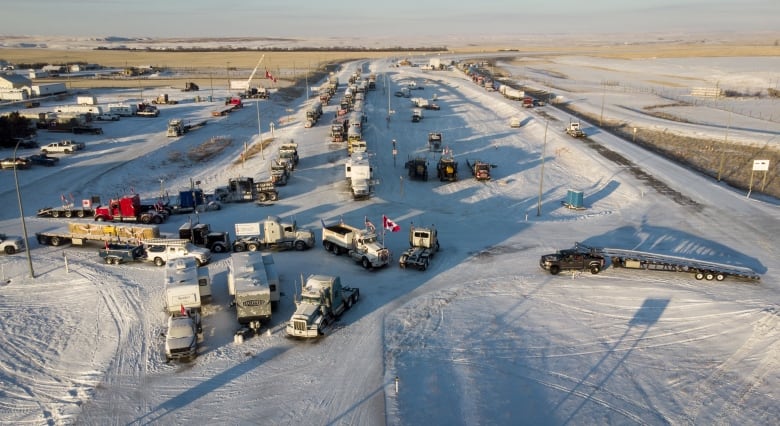End of Coutts' protest relieves some supply chain pressures, but retailers wary of future blockades
'We hope that law enforcement, governments have learned from this experience,' retailers group says

A grouprepresenting Alberta retailersis relieved withthe end ofprotests that impeded trade overa key bordercrossing between Canada andthe United States. But itshope nowis that police and governmentswill take stepsto prevent similar disruptions in the future.
"Earlier this month, we would've never imagined that the ongoing blockade would have been allowed to continue so long," said John Graham, director of government relations for the Retail Council of Canada.
"We hope that law enforcement [and] governments have learned from this experience and that they'll take steps to ensure that critical infrastructure like border crossings are uninterrupted for the flow of goods back and forth."
Before coming to an end this week, the blockade at Coutts, Alta., organizedbyprotesters opposed to Canada's vaccine mandates, interrupted cross-border truck traffic, disrupting tens ofmillions of dollars in daily commerce and piling new costs onto industries struggling with supply chain problems.
Graham said the retail communityis relievedthat the border crossing reopened, calling the closure a significant disruptionfor retail stores that relied on the regular, reliable flow of goods through Coutts.

He said retailers foundalternate routes to supply their stores, but it added time and costs.
"Our concern going forward is the reliability of that border remaining open and additional protests not erupting in the days or weeks ahead," Graham said.
Rob Williams, a spokesperson for AlbertaTransportation MinisterRajan Sawhney, said the provincial governmentwill help implement any requests made by law enforcement when called upon.
"However, any operational matters at the scene of a blockade or protest now or in the future are at the discretion of the RCMP," he said in a statement to CBC News.
Alberta RCMP spokesperson Fraser Logan said the force hasplans in place, but foroperational security reasons,it's not something that it'ssharingpublicly.
However, he said Mounties will be enforcing any contraventionof theCriminal Code, the Traffic Safety Act, highway and rules-of-the-road regulations, as well as the EmergenciesAct, "where it applies."
"We do have plenty of acts that we can draw from," he said.
The Canadian Manufacturers and Exporters has estimated thatbetween 800 to 1,200 trucks and about $44-million worth of goodspass through the Coutts border crossing daily.
David MacLean,the organization's Alberta vice-president, said there ismuchrelief in the manufacturing community now that the blockades have been removed.
He said the disruptions resulted in some manufacturers slowing down their operations, but they avoided shutdowns.
"Everybody across the board experienced some impact from the blockade, whether it was rising freight costs, delays, slowdowns in shipping," MacLean said.
"There was all sorts of inconveniences and real costs associated with the blockade."
MacLean said there's also an ongoing, chronic and global shortage of available trucksfor shipping that will take time for the supply chain toresolve. He said blockades and vaccine requirements for cross-border truckers didn't help.
But as the pandemic lifts and supply chains issues fade, he said he's optimistic of a strong turnaround in the province.
Bob Lowe, president of the Canadian Cattlemen's Association, said things are returning to normal for the province's cattle industry, adding the impact was fairly isolated and wouldn't affect prices.
Still, he saidthere was a lot of concern about how long the blockade would last and how that would affect the sector.
"I fully agree with the right to protest and, you know, they brought up some pretty legitimate at the beginning some pretty legitimate concerns that they had," Lowe said. "But as soon as you start breaking the law, that'sthe time that's supposed to endand it didn't."












_(720p).jpg)


 OFFICIAL HD MUSIC VIDEO.jpg)
.jpg)



























































































